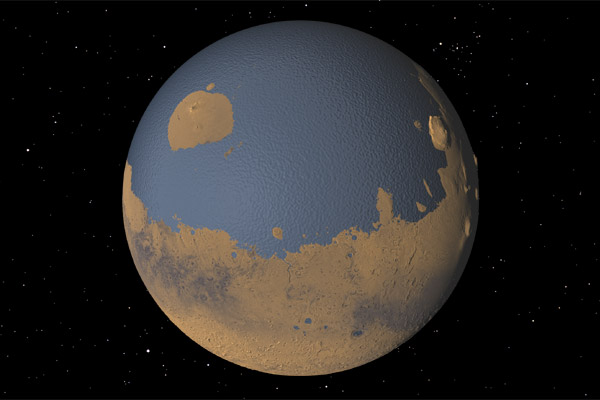We reach more than 65,000 registered users in Dec!! Register Now

NASA says that mars had an ocean
- March 06, 2015
- 1516 Views
- 0 Likes
- 0 Comment
An ocean on Mars once held more water than Earth's Arctic Ocean, according to NASA scientists who measured signatures of water in the planet's atmosphere. The results are being published in the journal Science on March 6. The young Red Planet would have had enough water to cover the whole surface in ...
An ocean on Mars once held more water than Earth's Arctic Ocean, according to NASA scientists who measured signatures of water in the planet's atmosphere.
The results are being published in the journal Science on March 6.
The young Red Planet would have had enough water to cover the whole surface in a liquid layer about 450 feet (137 meters) deep, according to researchers. More likely, they say, the water would have covered almost half of Mars' northern half, in some places reaching depths greater than a mile (1.6 kilometers).
“Our study provides a solid estimate of how much water Mars once had, by determining how much water was lost to space,” said Geronimo Villanueva, an author of the paper and scientist at NASA's Goddard Space Flight Center in Greenbelt, Md.
The estimate is based on observations of two slightly different forms of water in Mars' atmosphere. One is the familiar H2O, made with two hydrogen atoms and one oxygen atom. The other is HDO, a naturally occurring variation in which one hydrogen is replaced by a heavier form, called deuterium.
The two forms are naturally found in predictable ratios. Thus the investigators theorize that if there is an excess of HDO now, there must also have been more H20 in the past than there is now, and that this was lost.
The researchers distinguished the chemical signatures of the two types of water from the W. M. Keck Observatory in Hawaii, NASA's Infrared Telescope Facility, also in Hawaii, and from the European Southern Observatory's Very Large Telescope in Chile.
The team mapped H2O and HDO repeatedly over nearly six Earth years (about three Mars years), producing global snapshots of each as well as their ratio. The maps reveal seasonal changes and “microclimates,” even though modern Mars is essentially a desert, according to the researchers. These ratio maps are the first of their kind.
The team was especially interested in regions near the north and south poles, because the polar ice caps are the planet's largest known reservoir of water. The water stored there is thought to capture the evolution of Mars' water from the wet Noachian period, which ended about 3.7 billion years ago, to the present.
The new results show that atmospheric water in the near-polar region was “enriched” in HDO by a factor of seven relative to Earth's ocean water, according to the results. That would imply that water in Mars' permanent ice caps is enriched by eightfold. Mars must have lost a volume of water 6.5 times larger than the present polar caps to provide such large enrichment, the scientists calculated.
By that measure, they said, Mars' early ocean must have held at least 20 million cubic kilometers worth of water.
Based on the surface of Mars today, a likely location for this water would be in the Northern Plains, which has long been considered a good candidate because of the low-lying ground, the study further proposed. An ancient ocean there would have covered 19 percent of the planet's surface – by comparison, the Atlantic Ocean occupies 17 percent of Earth's surface.
“With Mars losing that much water, the planet was very likely wet for a longer period of time than was previously thought, suggesting the planet might have been habitable for longer,” said Michael Mumma, a senior scientist at Goddard and co-author on the paper.









